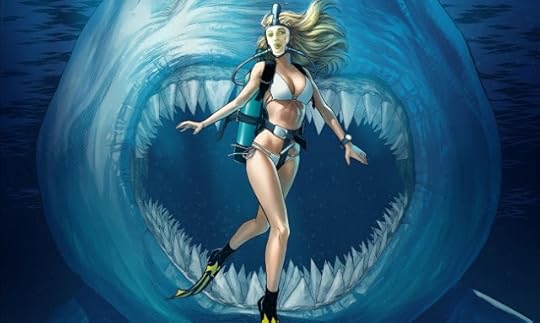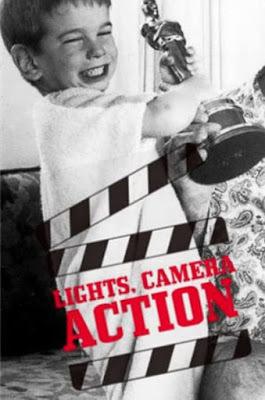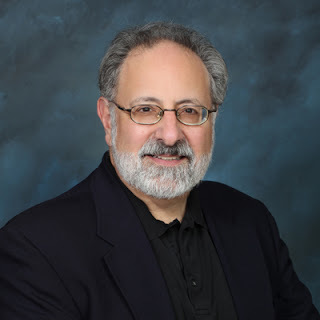Kenneth Atchity's Blog, page 123
March 13, 2018
Congratulations Michael A. Simpson!!
Published on March 13, 2018 11:20
March 11, 2018
Best friends try to have a threesome and shit gets weird.

Isaac and Charlie want more out of their friendship so they decide to organize a threesome. Enter Zoe- a cosmic bohemian wild woman living in a glass treehouse, who's actually just trying to get her shit together.
Zoe and Isaac fall in love, fast and hard. Charlie falls into a crisis of masculinity.
All three flounder as they earnestly seek an experience slightly beyond their grasp. Trying to figure out what turns them on and what gets them off.
Check out Threesomething.com

Published on March 11, 2018 00:00
March 9, 2018
DABEL BROTHERS PLANS 'MEG'-A TIE-IN

Dabel Brothers will be releasing a comic book tie-in for the Jason Statham-starring film MEG. Steve Alten, who wrote the novel on which the film is based, is writing the six-issue series. The first issue will ship in April.
 The comic, book, and film center on Jonas Taylor, who finds himself face-to-face with the largest predator in the history of the animal kingdom: Carcharodon megalodon, an immense (not so) extinct species of shark that is closely related to the great white.
The comic, book, and film center on Jonas Taylor, who finds himself face-to-face with the largest predator in the history of the animal kingdom: Carcharodon megalodon, an immense (not so) extinct species of shark that is closely related to the great white.
Jon Turtletaub (National Treasure) is directing the film, with Statham starring as Taylor. The film also stars Cliff Curtis (Fear the Walking Dead), Masi Oka (Heroes), Ruby Rose (John Wick: Chapter 2), and Bibgbing Li (Transformers: Age of Extinction).
Dabel Brothers announced last week that it would release a comic series based on Kevin Hearne’s Iron Druid Chronicles, which the publisher will distribute to comic stores itself (see "Dabel Brothers to Launch 'Iron Druid Chronicles' Comic").
Read more

Published on March 09, 2018 00:00
March 7, 2018
March 5, 2018
Michael A Simpson's Sons of My Fathers best "opening line" chosen by Publishers Weekly!
Published on March 05, 2018 00:00
March 3, 2018
'I Can't Believe I Am The First,' Says Oscar-Nominated Female Cinematographer

Rachel Morrison is the first woman ever nominated for an Oscar in cinematography.
"I can't believe I am the first," she says. "It's really kind of crazy!"
It was her lensing on Mudbound that earned her this recognition, but Morrison also served as director of photography for the massive blockbuster Black Panther. Being a DP means you're in charge of all the cameras, everyone who operates them, the electricity on set and the look of the entire film.
"The cinematographer's basically translating the director's vision into imagery," Morrison says. She leads the way down a set of outside stairs to her basement office at her home in the Mount Washington neighborhood of Los Angeles. "It's such a mess down here."
It's not that messy — merely crammed with art books, Black Panther comics and the DVDs she draws upon for reference and inspiration.
"A lot of the classics," Morrison says. "Godfather. Raging Bull. City Of God. [The] City Of Lost Children. Dekalog. I mean, Kieślowski was such a genius."
But the movie that changed Morrison's life was a foreign film she saw as a teenager in Cambridge, Mass.
"The film for me was this sort of obscure, French-Canadian film called Leolo," Morrison says. "It was playing in the Harvard Square Theater, and I think I had probably gone to see something else, and it was sold out. And I was like, 'Oh, I'll check out this film instead,' and it just blew my mind."
At the time, Morrison was transfixed by lush, surreal stories such as Leolo and the magical realism of writers like Gabriel García Márquez and Salman Rushdie. "Which, interestingly, is not at all the direction I've gone with my cinematography," she says.
Morrison's big breakthrough was with Fruitvale Station, an acclaimed 2013 movie that looks almost like a documentary. It was based on the real-life killing of a young black man by a transit police officer in Oakland, Calif. The film was also the breakout for director Ryan Coogler, who collaborated most recently with Morrison on Black Panther.
When Coogler made his "Rocky" movie, Creed, a few years ago, he asked Morrison to be director of photography. But the timing was off: Morrison had just gotten pregnant.
"I could totally shoot pregnant," she says. But she could not disrupt a shooting schedule by giving birth in the middle of making a film. Being both a mom and a director of photography is not exactly a Hollywood norm.
"I looked for a model before having my son," she says. "I sort of wanted to reassure my wife it could be done, and I quite frankly couldn't find one. Like, most of the [directors of photography] I talked to were men, and most of them were on their third marriages and had kids from different wives, and kids that weren't talking to them, and kids whose graduations they'd missed. There was some amount of remorse, and others saying, 'Don't make the mistakes I did,' and others who sort of said, 'That's just the nature of the business.'"
"And for me," she says quietly, "that's not OK."
Morrison is 39, but she looks younger, and she's used to being mistaken for a hair and makeup artist or as part of the catering crew. On Black Panther, where she was director of photography, Morrison once hopped in a van with the first assistant director — also a woman — to get to set. But the driver refused to budge.
"We were like, 'Hey, we gotta go,'" she says. "And he was like, 'I'm sorry, I'm waiting for the DP and the first AD.' And we were like, 'We are the DP and first AD!' And that happens more times than I can count."
On the set of Mudbound, Morrison was part of an intentionally female-led crew. The Netflix film follows the fortunes of a black family and a white one, hardscrabble farmers in the rural South.
Director Dee Rees remembers how Morrison positioned the camera during an especially tense scene. A young female sharecropper appears at the farm, brandishing a knife while two little girls play in the yard nearby. Murder is on her mind.
"Everything is angled to feel dangerous, in a way," Rees says. "Everything's geared for maximum tension. The knife is in the frame while the two girls are in the frame. So it's like the casualness of violence in the world, the everyday nearness of death, the everyday nearness of harm."
Rees says she loved Morrison's understated, elegant eye. So did one of the giants of cinematography. Before he died in 2015, Haskell Wexler (Who's Afraid Of Virginia Woolf?, One Flew Over The Cuckoo's Nest) saw Fruitvale Station and invited Morrison over for lunch.
"He actually said that what we did in Fruitvale was everything he aspired to do his entire career," Morrison says. She's proud, yet slightly abashed. "And it makes perfect sense. He made documentaries and he made narratives, but this was a film that really kind of blended both. So it was probably the most meaningful compliment I will ever get."
For a second, Morrison's eyes filled with tears, and then she laughed.
"He also made me hold his Oscar and said, 'You're gonna get one of these one day,' which I thought was crazy at the time," she says.
Maybe her historic nomination is connected to Wexler's legacy, she ventures. And then, part of it is more complicated.
"Now the trick for me is, I don't want to win for the wrong reason," she says. "Like, I don't want to win because I'm female. I'm kind of rooting for Deakins myself."
Roger Deakins was cinematographer of the new Blade Runner movie. He's been nominated 14 times and never won.
Like Deakins, Rachel Morrison expects to be recognized for the quality of her work. And she expects to be nominated again.
Read more

Published on March 03, 2018 00:00
March 1, 2018
Michael A Simpson's Sons of My Fathers best "opening line" chosen by Publishers Weekly!
Published on March 01, 2018 00:00
February 27, 2018
It’s The Oscars on TALKish, The Halli Casser-Jayne Show. Join Halli and director Charles Matthau for an Oscar celebration, February 28th, 3 pm ET.
 The Oscars! Hooray for Hollywood and hooray for the Oscars! This year’s 90th Academy Awards is the subject of The Halli Casser-Jayne Show, Wednesday, February 28, 3 pm ET. Joining Halli at her table is director, writer, producer, actor, and raconteur, Charles Matthau.
The Oscars! Hooray for Hollywood and hooray for the Oscars! This year’s 90th Academy Awards is the subject of The Halli Casser-Jayne Show, Wednesday, February 28, 3 pm ET. Joining Halli at her table is director, writer, producer, actor, and raconteur, Charles Matthau.He attended The Oscars when he was but a boy. Director Charles Matthau was weaned on film. His father was Academy Award-winning actor and comedian, Walter Matthau, best known for his role as Oscar Madison in The Odd Couple. Charles began acting when he was a kid; as a child he appeared in such films as Charley Varrick, The Bad News Bears and House Calls before at the ripe young age of 24, he turned to directing with The Grass Harp, from a novella by Truman Capote, and the made-for-TV movie The Marriage Fool. A graduate of the film school at the University of Southern California, Matthau also has directed Doin’ Time on Planet Earth, Her Minor Thing, Baby-O, and Freaky Deaky starring Christian Slater based on Elmore Leonard’s book, which Matthau also wrote. His latest film is The Book of Leah, starring Armand Assante currently in post production.
Film, Academy Awards, movies, actors, directors…it’s The Oscars on TALKish, The Halli Casser-Jayne Show. Join Halli and director Charles Matthau for an Oscar celebration, February 28th, 3 pm ET. The party takes place at Halli Casser-Jayne dot com.

Published on February 27, 2018 11:41
February 22, 2018
Strand Magazine: How being a psychotherapist helped me become a better writer by Dennis Palumbo
 I must admit, I’ve had an interesting career journey. For many years, I was a Hollywood screenwriter, after which I became a licensed psychotherapist specializing in treating creative types in the entertainment community. Now, after 28 years of listening to hundreds of people’s most intimate stories, I’ve fulfilled a lifelong dream and begun a series of crime novels.
I must admit, I’ve had an interesting career journey. For many years, I was a Hollywood screenwriter, after which I became a licensed psychotherapist specializing in treating creative types in the entertainment community. Now, after 28 years of listening to hundreds of people’s most intimate stories, I’ve fulfilled a lifelong dream and begun a series of crime novels.Given the kinds of books I write, you might be wondering what, if anything, do a Hollywood psychotherapist and a suspense novelist have in common? Actually, quite a bit.
For both a therapist and a crime novelist, it’s the mystery of character itself that intrigues, puzzles, and continually surprises. As a therapist, I’ve borne witness to the awful suffering, painful revelations, and admirable courage of my patients, many of whom have survived unbelievable abuse, neglect, and loss. Not to mention those whose lives have been marred by substance use, violence, and severe mental illness.
How people cope with these issues and events, how well or poorly they meet these challenges, goes directly to the heart of the therapeutic experience. My job as their therapist is to help patients identify self-destructive patterns of behavior and to empower them by providing tools to address these patterns and, hopefully, alter them.
So much for my day job. Moonlighting as a suspense novelist, I find myself doing pretty much the same thing with my fictional characters. As a mystery writer, I believe
that crime stems from strong emotions, and strong emotions stem from conflict.
Kind of like life.
Which means the secret to crafting satisfying thrillers lies in exploring who your characters are (as opposed to who they say they are), what it is they want (or think they need), and the lengths to which they’ll go to get it.
Moreover, using my experience as a licensed psychotherapist, I’ve woven many of the situations and people I’ve encountered into my crime novels. Among these is a particularly interesting patient I once met at the psychiatric hospital where I did my clinical internship. Now, many years later, he’s the inspiration for my hero’s best friend, a paranoid schizophrenic named Noah Frye. Much like this patient from long ago, the Noah of my novels is funny, combative, and achingly aware of the reality of his situation.
I’ve used other aspects of my life experience as well. For example, although my practice is in Los Angeles, the novels take place in Pittsburgh, my hometown. In addition, the series hero, a psychologist named Daniel Rinaldi who specializes in treating the victims of violent crime, shares a similar background to my own, from his Italian heritage to his love of jazz to his teenage years spent working in the Steel City’s sprawling produce yards. (Though, as each novel’s narrative hurtles Rinaldi into a vortex of murder and conspiracy, he reveals himself to be a lot braver and more resourceful than I am!)
There’s another connection between my role as a therapist and my role as a mystery writer. Like the therapist, the crime novelist swims in an ocean of envy, greed, regret, and desire. As a therapist does, the crime novelist must relate to his or her characters. Must be able to understand and empathize with their wants and needs. Must, in fact, go inside their heads and think as they think, feel as they must feel.
Since most of my patients are in the entertainment industry—writers, actors, directors, and others—they present a broad canvas of creative passions, lofty ambitions, wild yearnings, and devastating defeats. They love and hate deeply, with an artist’s fervor, and this extends beyond career considerations into the most intimate aspects of their personal lives.
So too the crime novelist must create and endow his or her characters with out-sized passions, hopes, and dreams. How else can things go so awry in their lives? How else can things lead, as if inevitably, to treachery, blackmail, murder?
All the things, in other words, that make reading a crime novel so satisfying!
BIO: Formerly a Hollywood screenwriter (My Favorite Year; Welcome Back, Kotter, etc.), Dennis Palumbo is now a licensed psychotherapist and author of Writing From the Inside Out (John Wiley). His mystery fiction has appeared in Ellery Queen’s Mystery Magazine, The Strand, Written By, and elsewhere, and is collected in From Crime to Crime (Tallfellow Press). His series of mystery thrillers (Mirror Image, Fever Dream, Night Terrors, Phantom Limb, and the latest, Head Wounds, all from Poisoned Pen Press) features psychologist Daniel Rinaldi, a trauma expert who consults with the Pittsburgh Police.
For more info, please visit www.dennispalumbo.com

Published on February 22, 2018 00:00











